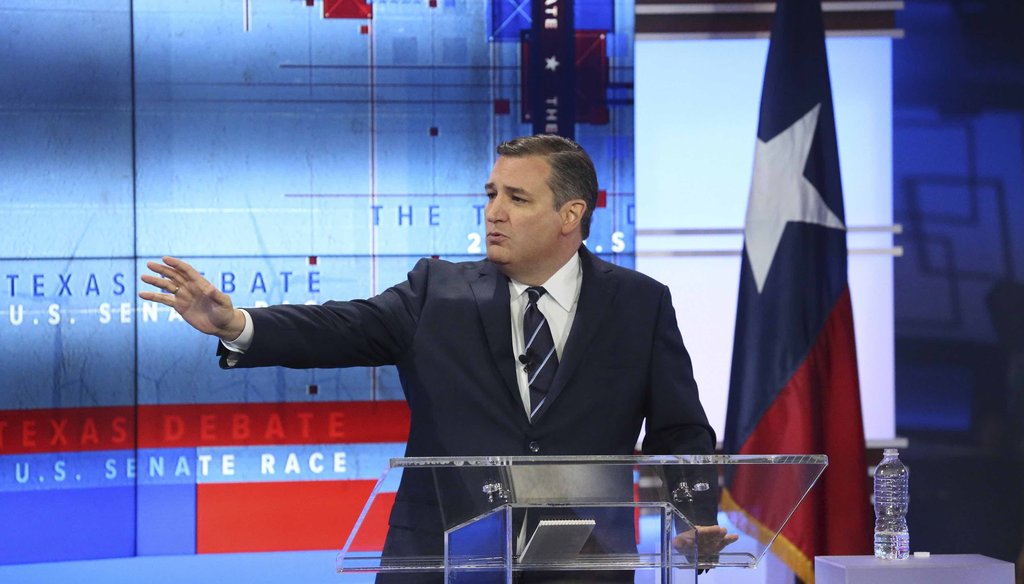Get PolitiFact in your inbox.

U.S. Sen. Ted Cruz debates U.S. Rep. Beto O'Rourke in San Antonio on Oct. 16, 2018.
Did Beto O'Rourke vote for $10 tax on a barrel of oil?
During their second televised debate, U.S. Sen. Ted Cruz said that U.S. Rep. Beto O’Rourke voted in favor of a $10 tax on each barrel of oil. The comment was among many heated remarks the two exchanged three weeks before the midterm elections.
About 11 minutes into the debate, WFAA-TV reporter Jason Whitely asked Cruz, R-Texas, about climate change. Whitely said Cruz is "clearly on record for years saying there's no evidence" to support the concept of human-caused climate change. Whitely noted that ExxonMobil says "the risk of climate change is clear and warrants action." He asked Cruz, "So, what do you tell Texas companies who think this really is a problem?"
Cruz replied, "Of course the climate is changing. "The climate has been changing from the dawn of time. The climate will change as long as we have a planet Earth. I am the son of two mathematicians and computer programmers. I believe in science."
Cruz ended his answer by saying Democrats are using climate change as a way to expand government power and control.
"That has led, for example, Congressman O'Rourke to cast some votes that I think are really harmful to the people of Texas," Cruz said. "For example, Congressman O'Rourke voted in favor of a $10 a barrel tax on every barrel of oil produced in the state of Texas. That would have been absolutely devastating to the state of Texas."
O'Rourke denied the claim.
"This is what you can expect over the course of this debate," O’Rourke said. "Senator Cruz is not going to be honest with you. He's going to make up positions and votes that I've never held or have ever taken. He's dishonest. That's why the president called him ‘Lyin’ Ted’, and it's why the nickname stuck, because it's true."
We tracked Cruz’s claim back to 2016, when President Barack Obama proposed "more than $300 billion worth of investments over the next decade in mass transit, high-speed rail, self-driving cars, and other transportation approaches designed to reduce carbon emissions and congestion" and a $10 tax to support its funding, according to Politico. Republicans in Congress introduced a resolution condemning the proposal. Cruz’s campaign pointed to the language of that resolution to support the senator’s claim and later shared a link to an October 9, 2018, article from The Dallas Morning News about the claim. The Dallas Morning News article fact-checked O’Rourke’s and Cruz’s positions but didn’t say who was correct.
The resolution states that "Resolved by the House of Representatives (the Senate concurring), That Congress finds that — (1) any new tax placed on the struggling oil and gas industry will further prevent growth and development throughout the sector and encourage additional layoffs; and (2) the effect of a $10 tax on each barrel of oil sold in the United States — (A) would raise the price of oil, and by extension gasoline; and (B) would result in a decrease in the consumption of oil."
The document concludes with the sense of Congress, which was "(1) a new tax should not be placed on oil, and 2) in considering future policy, Congress should carefully review the detrimental impacts of placing any new taxes on any industry that has seen a slash in jobs, revenue, and production." That language is verbatim what House Concurrent Resolution 112 states.
On the House floor, Republicans said funding should come from specific user fees and not a gas tax, that Obama's proposal would increase the cost of living for Americans and instead of talking about climate change, Congress should focus on improving economic conditions in the country, according to a list of actions compiled by C-SPAN. Democrats defended the proposal as a way to fight climate change and invest in infrastructure, and at least a solution on the table that can move the discussion forward. Democrats also criticized Republicans for not wanting to tackle climate change.
O’Rourke voted against the resolution, but it passed mostly with Republican support. Cruz never got the chance to vote on it, though, because after it passed out of the House, the Senate received the resolution on June 13, 2016, referred it to the Senate Finance Committee and took no further action, according to Congress’ online bill tracker. Obama backed away from the plan and didn’t include it in his budget proposal.
Congress’ online glossary defines a concurrent resolution as a "form of legislative measure used for the regulation of business within both chambers of Congress, not for proposing changes in law" and doesn’t require the president’s signature. In other words, the resolution condemning the oil barrel tax would not have had the force of law.
We asked O’Rourke campaign spokesman Chris Evans for an explanation of the congressman’s vote. Evans said O’Rourke didn’t vote in favor of a tax and pointed to the same Dallas Morning News article Cruz’s team referenced.
"As (The Dallas Morning News) points out, ’Legislation to enact a federal per-barrel oil tax hasn't even come up for a vote in the House since O'Rourke was elected in 2012,’" he said in an October 17, 2018, email. "Similarly, legislation that would enact a $10 a barrel tax on Texas produced oil has not come before Congress."
Evans added that "the resolution in question was not a vote on imposing such a tax, much less did it mention anything about oil produced in Texas."
"Beto voted against a non-binding resolution that voiced opposition to a proposal by President Obama to fund infrastructure investments," he said. "The proposal itself was never voted on. But put another way, had the resolution Senator Cruz names failed to pass the House, it still would not have enacted such a tax. There was no outcome from that resolution that would have imposed ‘a $10 a barrel tax on every barrel of oil produced in the state of Texas.’ Because, as I mentioned earlier, legislation to do that has not come before Congress."
Our ruling:
Cruz said O’Rourke voted in favor of a $10 tax on every barrel of oil.
O'Rourke didn't vote in favor of a $10 tax. He voted against condemning a proposal to do that, one that wasn't even up for consideration in his chamber or the Senate. Also, despite Cruz’s suggestion, nothing about the proposal was directed specifically at Texas.
Cruz’s claim thus has an element of truth but is otherwise off the mark. We rate Cruz’s claim Mostly False.
Our Sources
YouTube video, "Ted Cruz and Beto O’Rourke square off in final debate before midterm election," Oct. 16, 2018
Press release, "Beto O’Rourke Wants To Increase Texans’ Gas Taxes," Ted Cruz for Senate, Oct. 9, 2018
Resolution, "H.Con.Res.112 - Expressing the sense of Congress opposing the President's proposed $10 tax on every barrel of oil," Congress.gov, June 13, 2016
Email, Emily Miller and Catherine Frazier, spokeswomen, Ted Cruz for Senate, Oct. 17, 2018
Email, Chris Evans, communications director, Beto for Texas, Oct. 17, 2018
News article, "Obama to propose $10-a-barrel oil tax," Politico, Feb. 4, 2016
News article, "Fact check: Is Ted Cruz correct that Beto O'Rourke supported a $10 per barrel tax on oil?" The Dallas Morning News, Oct. 9, 2018
Web page, "Glossary," Congress.gov
Web page, "Glossary of Terms Related to Congressional Records," U.S. House of Representatives: History, Art & Archives
Web page, "H.CON.RES. 112: Expressing the sense of Congress opposing the President's proposed $10 tax on every barrel of oil," C-SPAN
Browse the Truth-O-Meter
More by Johnathan Silver
Did Beto O'Rourke vote for $10 tax on a barrel of oil?
Support independent fact-checking.
Become a member!
In a world of wild talk and fake news, help us stand up for the facts.





























